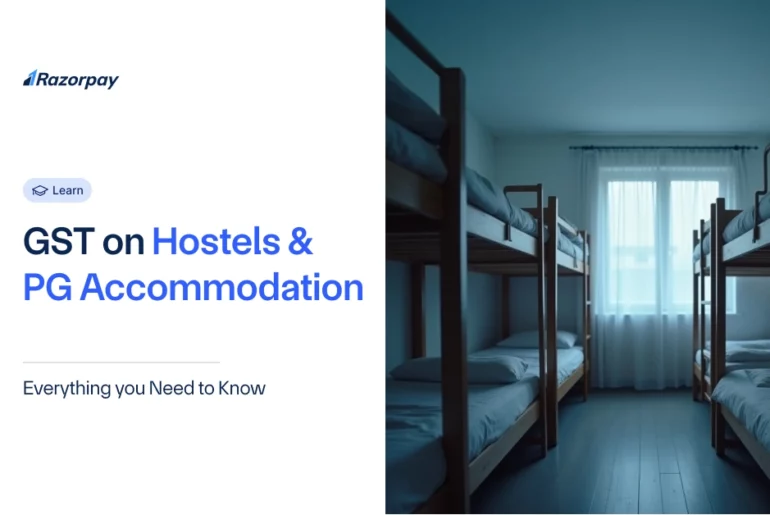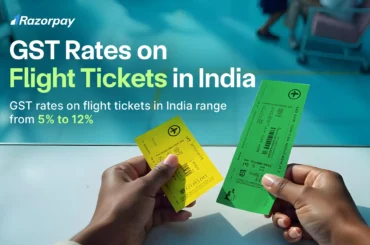The GST regime has brought about significant changes in the taxation of various services, including accommodation services like hostels and paying guest (PG) facilities. As a hostel or PG owner, it’s crucial to understand how GST on hostels and PG accommodation works. In this article, we’ll delve into the key aspects of GST on hostel rent, including rates, exemptions, and compliance requirements, to help you navigate this tax system effectively.
Before 18th July 2022, hostel and PG stays under ₹1,000/day were GST-exempt. Post this date, the exemption was removed, and all such accommodations now attract 12% GST, regardless of tariff. This change impacts both business operations and increases living costs for students and professionals.
Table of Contents
Exemption Based on Daily Tariff
1. Tariff Below ₹1,000 per Day:
Before the recent changes, hostels and PGs with a daily tariff below ₹1,000 were exempt from GST. This meant that businesses providing low-cost accommodation to students and young professionals could operate without the burden of GST compliance. However, this exemption is no longer applicable, and all hostels and PGs are now subject to GST, irrespective of their daily tariff.
For Example – If a hostel charged ₹950 per day before July 18, 2022, it was tax-free. After the exemption removal, the same accommodation now attracts 12% GST, increasing the effective cost to ₹1,064 per day. This directly impacts affordability for students and professionals staying in budget hostels and PGs.
2. Tariff Above ₹1,000 per Day:
For hostels and PGs with a daily tariff of ₹1,000 and above, GST has always been applicable at a rate of 12%. This rate continues to apply even after the recent changes, ensuring consistency for higher-priced accommodations. Businesses in this category must collect and remit GST on their services, maintain proper records, and file regular returns.
How GST Impacts Your Hostel or PG Business?
GST on hostel fees impacts PG and hostel businesses by requiring them to factor in 12% tax, raising costs for tenants. They must also ensure compliance through GST registration, proper invoicing, record-keeping, and timely return filing to avoid penalties.
1. GST Registration Requirements
Hostels and PGs providing taxable accommodation services are required to obtain GST registration if their aggregate turnover exceeds ₹20 lakhs (₹10 lakhs for special category states) in a financial year. Those providing only exempt services, such as hostels run by educational institutions for their own students, need not register under GST.
2. Eligibility for Input Tax Credit (ITC)
Hostel and PG service providers can claim Input Tax Credit (ITC) on the GST paid on inputs and input services used in providing the accommodation services. Eligible ITC includes GST paid on goods and services such as furniture, electricity, water, housekeeping, repairs, and maintenance used for the hostel/PG. However, ITC cannot be claimed on inputs and input services used for providing exempt supplies.
GST and Composite Supplies: Understanding Bundled Services
In some cases, hostels and PGs may offer bundled services, such as accommodation, meals, laundry, and other amenities, as a package. These bundled services are known as composite supplies under GST.
How GST Applies to Composite Supplies
When services like meals and laundry are bundled with accommodation, GST is applied based on the principal supply, which is the accommodation service in this case. This means that the entire composite supply attracts GST at the rate applicable to the accommodation service, which is currently 12%.
GST’s Effect on Students and Young Professionals in Hostels and PGs
The 12% GST on all hostel and PG tariffs directly raises living costs for students and young professionals.
1. Impact on Costs
Students and professionals must be aware of the GST component in their hostel or PG rent. It’s essential to clarify with the accommodation provider whether the quoted rent is inclusive or exclusive of GST. This transparency helps in budgeting and understanding the true cost of living in a hostel or PG.
2. Tax Invoices and Receipts Explained
Hostel and PG owners are required to issue tax invoices or receipts to their tenants, clearly indicating the GST amount charged. These invoices serve as proof of payment and can be used for claiming ITC, if applicable. Students and professionals should ensure that they receive proper tax invoices for their records.
Latest GST Guidelines You Need to Know
Staying updated with the latest GST guidelines is crucial for hostel and PG owners to ensure compliance and avoid penalties.
Key Updates from Recent Guidelines:
-
Removal of the exemption for tariffs below ₹1,000 per day, effective from 18th July 2022.
-
All hostel and PG accommodation services now attract GST at a rate of 12%, regardless of the tariff.
-
Educational institutions providing hostel facilities to their own students remain exempt from GST.
Commercial vs. Residential Accommodation: GST Rules Simplified
Understanding the distinction between commercial and residential accommodation is essential for determining the applicable GST rates and exemptions.
1. Residential Accommodation: GST Considerations
Residential accommodation, such as PGs and hostels, are subject to GST at a rate of 12%. However, certain exemptions may apply based on the type of service provider and the beneficiaries. For example, hostels run by educational institutions for their students are exempt from GST.
2. Commercial Accommodation: GST Rules
Commercial accommodation, such as hotels and guest houses, attracts GST based on the room tariff. GST on Hotel Rooms varies depending on the price per night, with different rates applicable for tariffs below ₹1,000, between ₹1,000 and ₹7,500, and above ₹7,500.
Debunking Common Myths About GST on Hostel and PG Services
There are common myths about GST on PG and hostel rent—let’s clarify them.
-
Myth: All hostels and PGs are exempt from GST.
Fact: Only hostel accommodation provided by educational institutions to students is exempt. Privately-run hostels and PGs are subject to GST. -
Myth: GST is applicable only on luxury hostels and PGs.
Fact: GST is applicable on all privately-run hostels and PGs, irrespective of their tariff value, effective from July 18, 2022.
GST Compliance Tips: Avoiding Common Mistakes
Hostel and PG owners should follow GST best practices for smooth compliance. These include:
-
Obtaining a valid GST registration and displaying the GSTIN prominently at the premises.
-
Issuing proper tax invoices with all the necessary details, including the GST amount.
-
Maintaining accurate records of supplies made, taxes collected, and ITC availed.
-
Filing regular GST returns within the prescribed timelines.
-
Staying updated with the latest GST notifications, circulars, and amendments.
FAQs:
1. Do hostels need to register for GST?
Hostels with a turnover exceeding the threshold limit of ₹20 lakhs per annum (₹10 lakhs for special category states) are required to register under GST.
2. Is GST charged on food served in hostels?
If the hostel provides food as a bundled service along with accommodation, and the daily tariff is above ₹1,000, GST at 12% is applicable on the entire package, including food.
3. What services are covered under GST in a hostel?
The accommodation services provided by a hostel, along with any bundled services such as meals, laundry, and housekeeping, are covered under GST if the daily tariff is above ₹1,000.
4. Do hostels need to issue GST invoices?
Yes, hostels registered under GST are required to issue tax invoices to their customers, clearly indicating the GST amount charged.
5. What happens if a hostel or PG fails to register for GST?
Failure to obtain GST registration when required can result in penalties, interest, and legal consequences. It is advisable to comply with the registration requirements to avoid any issues.
6. Is GST applicable on security deposits paid to hostels/PGs?
Security deposits paid to hostels or PGs are not subject to GST. However, if the deposit is non-refundable and treated as a consideration for the accommodation services, GST may apply.
7. Can students claim GST refunds on hostel rent?
Students residing in hostels with a daily tariff above ₹1,000 cannot claim GST refunds on the hostel rent paid. The GST paid becomes a cost to them.
8. Do hostels need to charge GST if they provide accommodation below ₹1,000 per day?
No, hostels providing accommodation with a daily tariff below ₹1,000 are exempt from charging GST on the services provided.



